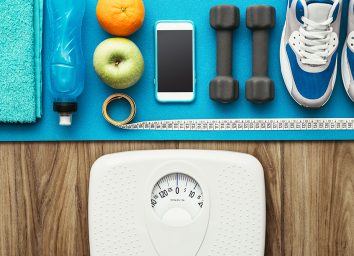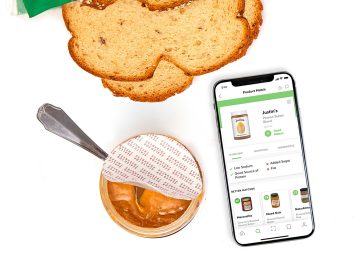
Nowadays, it's easier than ever to stay accountable with your healthy eating goals' thanks to the many diet apps on the market. Noom, the weight loss app that's designed with millennials in mind, is here to stay, with its easy-to-use programming that has users hooked and actually excited to eat healthily. Instead of recommending fad diets, the app dissects your daily actions and choices to help create a lifestyle that you're proud of.
We spoke with registered dietitians to get their insight on what the app does, whether or not it's worth the cost, and how exactly you can lose weight with it.
"The Noom app was designed by behavioral psychologists to create a more sustainable health and weight loss virtual tool, contrary to all the restrictive extreme diets that cut out food groups and require strict unrealistic counting," says Laura Burak, registered dietitian and owner of Laura Burak Nutrition. "It combines a food logging program with simple coaching and accountability from virtual coaches and gives its users a community of other users for support."
What does the Noom app do?
The Noom app mainly focuses on behavior changes to help people lose weight and live a healthy lifestyle. According to NYC-based registered dietitian Natalie Rizzo, the Noom app has gained a following among young adults and is often touted as "the 'Weight Watchers for millennials' due to its regular check-in feature that pairs users with a specialist who will help them achieve their goals."
When you pay Noom's monthly fee, you'll get access to a "coach" to help you along your journey. After downloading the app, you'll be asked a series of questions about your diet and lifestyle habits, such as how many meals you typically eat and what your typical lunches include. The app also takes your medical history into account, asking if you're at risk for conditions like high blood pressure or diabetes.
Once you're set up, you'll be able to log your food intake according to Noom's system. The app's program encourages users to eat foods with a lower caloric density, to still feel full while eating fewer calories.
"The app also uses a color-coded system (green, yellow, and red) to teach people how to eat food in moderation," Rizzo says. "Also, no food is off-limits. What I like about the app is that they address individual behaviors, which is necessary to modify your lifestyle for long-term sustainable goals."
Another major benefit of the app is that it includes a recipes tab, so you can find healthy meal ideas in the same place you're logging your food. The recipes include everything from smoothies to tacos, and you can even search the recipe list by category or by ingredient.
How much does the Noom app cost?
The app costs $44.99 per month. In exchange for the fee, you'll be able to track the foods you eat, log your exercise and weight, and access the recipe tab, in addition to communicating with your coaches. That includes a "goal specialist" as well as a group coach, who works with you and other Noom users.
"I think the cost is subjective since everyone has different income levels and budgets," says Rizzo. "That said, I do think it's worth investing money in your health if you can afford it. If you think Noom is something that sounds right up your alley, and you think you'll be able to stick with it for the long haul, then it might be worth trying out."
Is the Noom app safe?
There is nothing indicating that using the Noom app isn't safe. However, Cynthia Sass, an LA-based performance nutritionist and registered dietitian says that "if someone has any kind of special dietary needs, such as food sensitivities or allergies, or chronic conditions like IBS, I think it's best to work directly with a registered dietitian nutritionist, as a dietitian's training includes both clinical nutrition and weight loss."
Before signing up for an app like this, Sass recommends taking the time to read some reviews and think through the pros and cons. You might also want to research what the options are for in-person RD consultations in your area, rather than paying for the app.
What other apps are similar to Noom?
Gigi Rubin, an NYC-based registered dietitian, thinks the Weight Watchers app is helpful. "The new WW app is a great app for weight loss, built on a tried and trusted program that has been around since the 70s," she says. "While the program changes periodically, users are frequently receiving updates and tutorials to make any transition smooth. One major plus of the WW app is the connect feature, which allows users all over the world to connect with each other and share success."
MyFitnessPal seems to be among the most popular of the diet apps, too. "Some of my clients use MyFitnessPal, but it's a much different app," Sass says. "It tends to work well for people who aren't looking for a comprehensive program—maybe people who are already working with a registered dietitian one on one, or who have their own personalized plan."
So if Noom doesn't sound like the right fit for you, or you can't handle the monthly fee right now, one of these other apps might be a good choice, too.
Is Noom right for you?
Burak says that Noom can be a good option for people who need accountability at an affordable price and thrives in an online community environment.
Noom may work well for people who don't want to ban any food, Sass adds. "It emphasizes eating more nutrient-dense foods (labeled green), such as fresh produce, and minimizing the portions and/or frequency of yellow (proteins, starches) and red-tagged foods (the latter being pizza, candy, alcohol, and the like)," she says. But if you're eating a majority of green foods, you can make room to include your favorite red foods every once in a while.
Another pro is that Noom addresses emotional and social eating and is great for those who want to plan ahead for special events, like a party, holiday, or vacation.
If the monthly cost isn't a deal-breaker for you, it might be worth trying out the Noom app.








